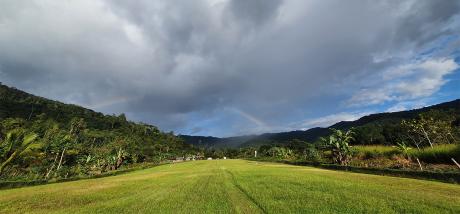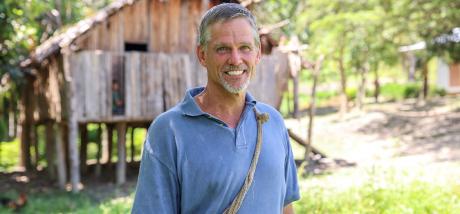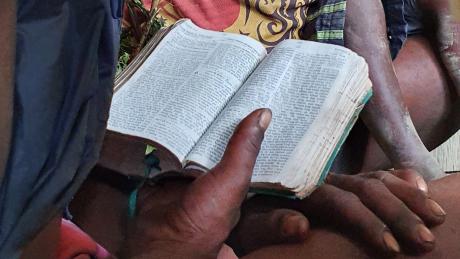
The Hewas - God’s story, God’s people, God’s future.
The Hewa tribe has anywhere from 3,000 to 6,000 people, but no one really knows. The people are living separated in little hamlets, scattered over 60 miles of rugged terrain in the Central Ranges of PNG. Jonathan Kopf, together with his wife and family is working among these people and trying to make a difference: teaching them the Gospel and translating God’s Word into their heart language, helping them with their medical needs and education for their children.
The Kopf family arrived in PNG in 1999 and in 2000 moved into the Hewa tribe, built friendships as they emerged into the people’s day-to-day life and culture, learning their language to eventually share God’s Word with them.
In this four-part story, Jonathan takes us along with his family on the adventure of reaching the Hewas with the message of God’s love and to provide for their basic medical and educational needs.
The Message of the Light
We arrived in a village called Fiawana. At first, the people were very eager to have us there, and they were excited to hear the message of the light. They said, ‘We’re in the darkness of the jungle, and we know you have the story of the light. We want to hear that story’. So, we learned their language and we got to a place where we could start translating the Bible. We decided to teach an overview of the story of the Bible from Genesis, and then end with the life, death, burial, and resurrection of Jesus.
As we were teaching through that, we were also working on other things. One was constructing an airstrip.
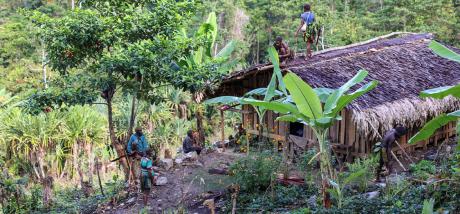
Goods instead of God
When they got the airstrip, they started seeing things like a little medical clinic, and then also store goods. Their attention went completely to the store goods, the medical, and the school that we were trying to start. They didn’t listen so much to the message anymore. They saw the metal-roofed buildings that we had built for our families. And they said, ‘The light has arrived.’
And we said, no, wait a minute, that’s not the light. The light is the story of Jesus. You need to hear this story. But they were so fascinated with the stuff that they didn’t listen well to God’s story, and it became frustrating.
But the problem was that their enemies started moving in at the same time to take these goods and use the services that we were providing. They were pillaging and abusing our Hewa friends, the people we’d come to love and know.
Out of that fighting rose lots of warfare. People were killed. Even right in my own yard. It just became too violent to stay there. And so, we ended up having to leave and that was hard. To leave all that we had built, the airstrip with the help of so many volunteers, the medical clinic, and the infrastructure that we built. We decided we really needed to walk away and leave it.
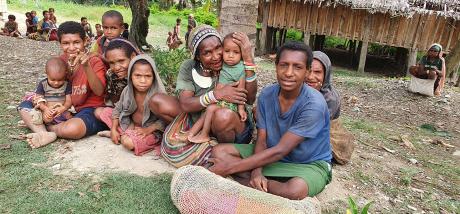
A new Beginning
We were praying with the few believers that God had given us at that time. One of them was a teenager named Yanis. He said, ‘You know what, my grandfather (He was referring to his grandmother’s brother) really wants to hear this story. I think I want to go live in his village to tell him about it. You can come with me if you want.’
With that invitation, I hiked with Yanis for two days, over two mountain peaks, before we finally arrived to where his relatives lived. Once we were there, and the village leaders told us they wanted to hear the story, we started the same kind of teaching program we had followed in Fiyawena. This time, however, we told them we had not come to provide store goods. We told them we were there for one reason and that was to teach an overview of the important message of the Bible.
The village said, ‘Yes, this is what we want to hear. Don’t bring store goods. Don’t bring anything that would be attractive to enemies.’
And so, we started teaching, first, how to read and write in their own language and then an overview of the story of the Bible. That village of back then only 50 people was very excited.
This is who we are, this is what we are. We are on the Jesus trail. We are Jesus’ followers, and we need you to stay with us because this is all new to us. We’ve never heard stuff like this before, so stay here and keep living with us.
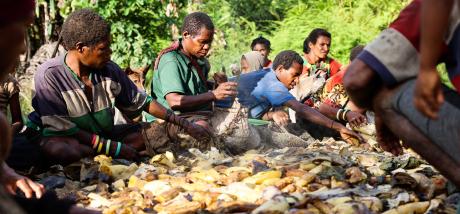
On the Jesus Trail
After a while, our family went to the States on furlough. During that time, we adopted a daughter from the States, and as we would go back and forth, our Hewa friends would continue to be hungry asking, ‘What are you going to teach us next?’
As I was translating the Bible books of Ephesians, Romans, and 1 Corinthians, and as we taught the important truths of these books to our Hewa friends they said, ‘This is who we are. We are now Jesus people and we are on the Jesus trail. We need you to stay with us because this is all very new to us. We’ve never heard teaching like this before, so stay here to keep teaching us.’
But they also pointed out one problem, ‘When you go to the States for a year or two, we’re in trouble when a medical crisis arrives. You’ve taught us how to take care of our basic needs, like malaria and pneumonia. Now we know how to diagnose and treat those things. But when there are big situations, big sicknesses, or a pregnancy that’s gone bad, we don’t know how to help ourselves.’
That’s a legitimate need. While we were in the States for two years to adopt our daughter, three of their 50 people had died. They asked, ‘Is there any way you can help us build an airstrip?’
The leaders of the village were the village shaman and his son, who he was teaching the art of witchcraft. These two said, ‘You know what, we’ve been lied to by our ancestors. We realise now that what we’ve heard from the Bible is true. This is what we want to hear. We don’t want any store goods. We don’t want anything else. We just want to hear this story. So, stay and live with us. Please.’
They provided us with village huts to live in and sweet potatoes to eat. We were living and working in really rugged conditions.
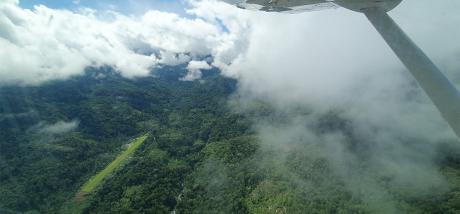
Building an Airstrip
We started going all over the mountains looking for a flat spot, a place where we could build an airstrip. They hiked me everywhere! We spent the night all over the place in these really rugged conditions and finally located the perfect valley, just long and wide enough to build an airstrip, 600 meters long, 75 meters wide.
We talked about it, and prayed about it with the people. If we build an airstrip, it will attract enemies. Will it actually backfire and destroy what we’ve really tried to create here, a village that’s following Jesus? And they said, ‘We’re going to do everything in our power to keep people from getting enticed and start to be captivated by material goods. But yes, can you help us build an airstrip?’
We had no money, no way to do this kind of project. But we said, okay, you guys can do a lot of the legwork here. You can get rid of all the 75-to-100-foot trees on this airstrip spot. Don’t cut them down because we have no tractor, we have no backhoe, no way to get rid of these monstrous root balls. But if you’ll dig out these trees so that when the trees fall over, you cut them up, burn them up. And I’ll see what I can do about finding a tractor. We’ll just pray together and see what God does.
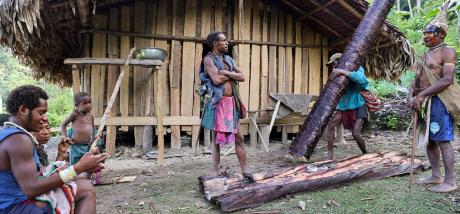
God provides
It was amazing! They started digging out these monstrous trees on this 600-meter-long area. As we were getting done with all the trees, a ministry called ‘Friends in Action’ offered us a tractor, a little Kubota, it was small, but it was God’s provision.
Friends in Action helped us take that tractor apart. A helicopter brought it in, and we were able to use it to level and create a crown on this airstrip and build this airstrip in a matter of four months.
And in August 2013, I think it was, the airplane landed here for the first time.
The importance of Airplanes
Airplanes are really important in their lives because there are no roads, there’s no river access, there are no canoes or boats going back and forth, and no cars. It takes the people four days to hike to the nearest town. Four days! So, if somebody is really sick, how can they hike them out? A four-day hike? This airstrip is very important. They use it all the time.
MAF has been a fantastic blessing to this tribe because when there’s a medical emergency, MAF is available to come and help. Like right now, for our teachers, for the school that we’ve started, the teachers need to be able to get back to town during school break and come back to the village. It’s just a real blessing to have MAF helping us here in the tribe. Thank you!
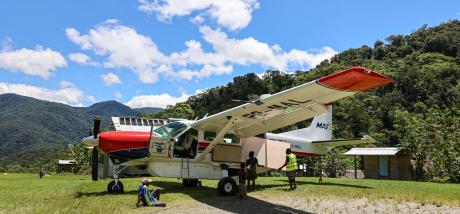
It’s about God
The story continues. God is doing something beautiful. Sure, there are challenges all through. It’s an adventure. God has called us to participate with him in this big, beautiful grand story.
And it’s not about us as missionaries. It’s not about any particular ministry. It’s about God and his awesome story and what he’s doing in the lives of people. But he invites us to take part in his story, and I am just extremely grateful for MAF and the huge impact they have here in this village among my friends, these Hewa tribal people.
Yes, the story continues. The next part will focus on the tribe’s pledge for education.
Read it HERE.
